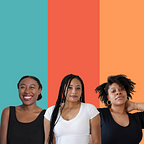How Can We Move Forward in a Colorist Society?
Colorism is common in many cultures and has been as long as we can remember. Why is it still so hard for us to address and move past in the 21st century?
As a lighter skinned Black person, I didn’t understand the impact of colorism until I left my small town and graduated college. I am the lightest person in my family and had always appreciated my family of a darker tone. I had grown up around confident Black people and never thought of them any less because they were darker skinned. If anything, I was the outsider and would look forward to summer so my color could be closer to my family’s, which I loved.
When I started dating more, I took notice of times when men would always mention my lighter skin. They would always equate me to being beautiful because I had light skin or assumed I was mixed because of my color. When I told them both my parents are just Black they seemed disappointed. Now that I’m older if anyone approaches me and skin color is one of the first things they mention I immediately walk away and don’t entertain the conversation. I don’t want to attract interest because of my skin color and ability to pass as “mixed” or “exotica.” I want someone who appreciates Black people and Black culture and would also love me if I had darker skin. Being light skin or mixed is not a personality trait and the obsession especially among Black men is unsettling.
Colorism is rooted deep in society. And where does it come from? You guessed it… slavery! I don’t take pride in my lighter skin because I know that the reason I am this shade is due to a gross pass of rape from slaveowners. It’s crazy that even today people do not understand how two darker skinned people could produce a light skin child.
The definition of colorism is the practice of discrimination by which those with lighter skin are treated more favorably than those with darker skin (NCCJ). This started when lighter-skinned slaves were given domestic tasks within the slave owner’s home, meanwhile those with darker skin were regulated to more grueling field work. Slaves with lighter skin were seen more favorably because they were often the product of a slave owner raping a slave and were therefore seen as being closer to white. In the 19th and 20th century, the “paper bag test” was used in Black spaces and as a way to hire Black people. If someone was the same color as or lighter than a paper bag, they would be allowed into the space. If they were any darker than a paper bag, they would not. These tactics were created by white supremacy as a way to discriminate and divide and still haunt us today.
Colorism is not limited to Black people. There are colorist ideas in cultures in India and Latin America. This was highlighted in Netflix’s Indian Matchmaking where many of the singles would mention that they wanted a partner that was “fair skin.” Many white Latinos or lighter Afro-latinos ofter try to block out darker Afro-Latinos and believe they are more superior because their lighter skin. According to Vogue, by 2027 the skin whitening market is estimated to be over $24 billion, which is highly marketed in India and Africa.
Many POC don’t pay attention or think they are colorist but it’s almost ingrained in our society and culture. How many rappers have lyrics talking about “red bones” or “yellow bones” when talking about the type of women they want or find attractive. We almost never hear lyrics talking about the beauty of darker skin. DaniLeigh decided to put out an entire song called “Yellow Bone” and failed to understand why the lyrics were problematic once she was called out on it. In media, how many times do we see a dark skinned actor get picked for a lead role or a role that is presented in a positive light? If Hollywood does decide to cast Black actors its typically people who look like or have the same skin color as Zendaya, Amandla Stenberg, Tessa Thompson, Zoë Kravitz, etc. Even content that is supposed to be “progressive” like Hamilton and Bridgerton are problematic with how they portray characters of darker shades.
This might sound “nit picky” to you or you might think it’s not that big of a deal but it’s another way of how we let white supremacy prosper in society almost subconsciously. Light skin privilege and white passing privilege is a real thing. And if you have this privilege it’s up to you to address it and be aware of it similar to how we ask white people to address their white privilege.
So before you continue to compliment someone for their light skin or fear that you’ll get dark in the summer, think about why those phrases are coming out of your mouth and how you perpetuate colorism.
The Oreos deep dive into the definition and history of colorism and discuss how colorism is ingrained in our society with a particular focus in media. The hosts discuss how dark skinned characters are portrayed in some of our favorite content such as Hamilton, The Proud Family, The Parkers and most recently the colorism controversy in Indian Matchmaking on Netflix and OWN’s docuseries Black Love. Each host gives their personal experience with colorism and the negative effects they have witnessed from the people around them before addressing the audiences’ comments and experiences on the topic.
The So-Called Oreos Podcast is available on all podcast platforms! Please support by rating, following and leaving a review!
Join us on Discord!: discord.gg/d3RrepdTdQ
So-Called Oreos Club: www.joinclubhouse.com/club/so-called-oreos
Email: socalledoreos@gmail.com
Twitter: @socalledoreos
Instagram: @socalledoreos
Facebook: www.facebook.com/socalledoreos/
YouTube: bit.ly/3nutxC2
Audience Survey: bit.ly/2vOYtH9
